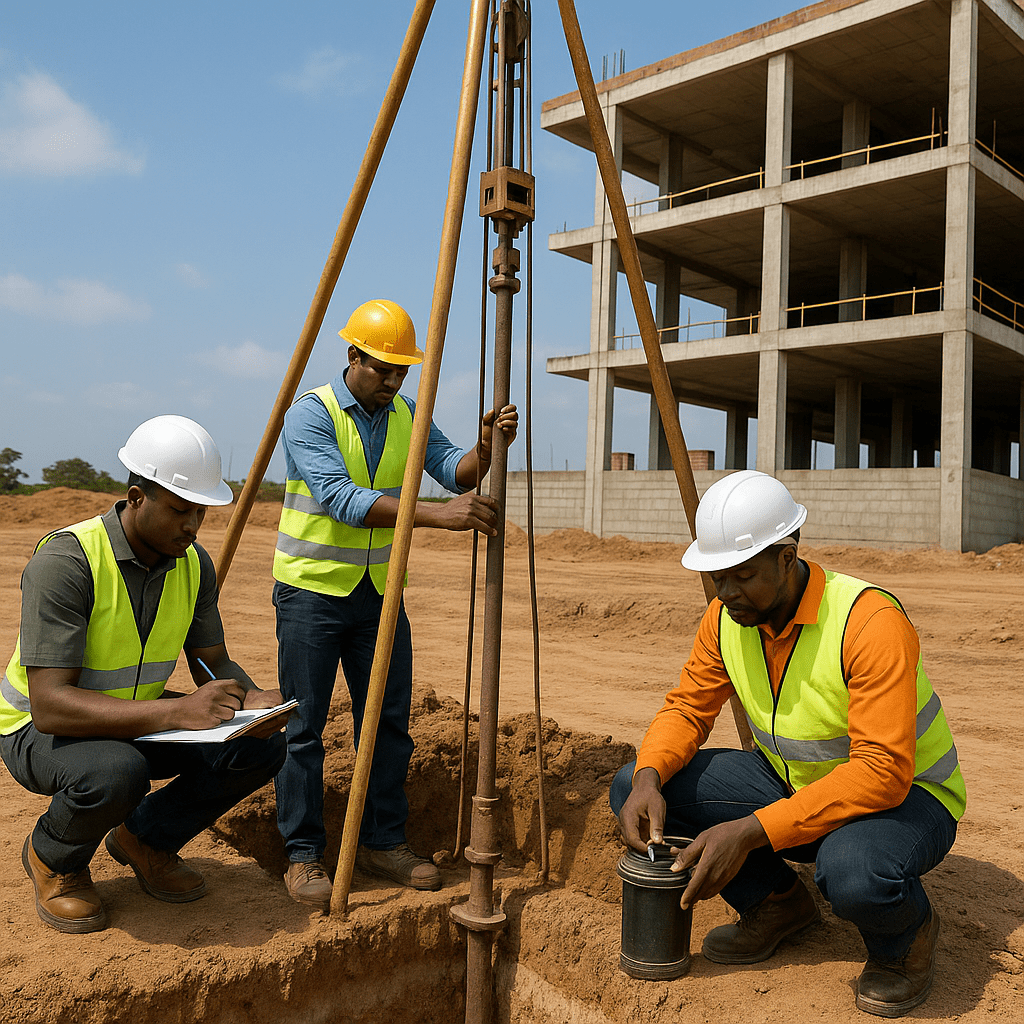
At Conifer Konstruktion Nig. Ltd, we believe that a building is only as strong as the ground it stands on. That’s why Geotechnical Engineering is a foundational part of how we deliver safe, long-lasting, and stress-free construction across Nigeria. Whether you’re building a dream home in Awka, a hotel in Enugu, or an industrial complex in Port Harcourt, understanding the ground beneath your feet is critical. In this article, we break down what geotechnical engineering is, why it matters, and how Conifer uses it to protect your investment. Geotechnical Engineering is a specialized field within civil engineering that focuses on how soil, rock, and groundwater affect construction. It ensures that buildings, roads, bridges, and even underground tanks are designed in harmony with the earth. Geotechnical engineers study the mechanical, chemical, and physical properties of soil and rock. Their findings help determine the type of foundation needed, prevent structural failures, and guide earthwork designs. Think of them as the engineers who ask: Can this land carry the weight of your vision? A building may look strong above ground, but if the soil underneath is unstable, the risk of cracks, sinking, or collapse is real. Conifer begins every major project with a geotechnical investigation to avoid such outcomes. With accurate geotechnical data, we can avoid overdesigning or using excessive materials “just to be safe.” This reduces waste and ensures you only pay for what your structure truly needs. Knowing the soil conditions up front helps our engineers choose the right equipment, construction method, and foundation strategy—saving time and avoiding surprises. We plan for soil movement, water flow, erosion, and expansion—especially important in Nigeria’s varied climate and soil zones. This ensures your building remains stable for decades. We start with thorough site studies using boreholes, test pits, and soil sampling. Whether you’re building on clay, laterite, or reclaimed land, we dig deep (literally) to know what we’re working with. Our geotechnical partners analyze soil samples to test for bearing capacity, moisture content, compaction, permeability, and more. This tells us how much weight your soil can support and how it will behave during construction. Based on test results, our structural and geotechnical teams recommend the most suitable foundation: Shallow foundations for firm soil. Raft or mat foundations for soft soil with uniform loads. Pile foundations where deep stability is needed, especially in waterlogged or clay-rich areas. This stage also considers drainage, settlement risk, slope stability, and future soil movement. Conifer doesn’t just design and walk away. We monitor soil conditions during excavation and foundation laying. If conditions change or unexpected ground behavior arises, we adjust in real time. In Nigeria, where climate and environmental factors can be unpredictable, durability and sustainability are key to reducing long-term expenses. Buildings that stand the test of time and integrate eco-friendly solutions not only save money but also attract higher market value. Focusing on sustainability and durability enhances your property’s value while contributing to a greener future in the Nigerian real estate market. These soils swell when wet and shrink when dry. We mitigate with deep foundations and soil stabilization techniques. We handle high water tables and weak soils using piles, drainage systems, and soil replacement methods. Our geotechnical assessments help us design retaining walls, revetments, and drainage plans that prevent future landslides. In places with very strong soils, we sometimes reduce excavation costs by using strip or pad footings instead of deep piling. Choosing to skip geotechnical studies or working with contractors who don’t understand soil behavior can lead to: Foundation failure Cracks in walls and floors Uneven settlement Delays due to unexpected ground conditions Increased costs from retrofitting and redesign Conifer’s integrated engineering approach ensures none of these become your headache. Yes—especially if your building has more than one floor, is on a slope, or the site is waterlogged. It’s a small investment that saves you big costs later. Typically, 7–30 working days, depending on the depth of investigation and laboratory turnaround times. Absolutely. We manage everything from sample collection to lab analysis, report interpretation, and final foundation design. The ground beneath your structure is not guesswork—it’s science. Geotechnical engineering is the silent guardian that ensures your building stands strong, safe, and steady for decades. At Conifer Konstruktion Nig. Ltd, we don’t gamble with your future. We investigate. We analyze. We design with the earth in mind. Start your project the right way—get a professional geotechnical assessment from Conifer. Call us today at +234-7000CONIFER for a free consultation on how we can handle your geotechnical investigation and foundation design—from soil test to structural drawing. Geotechnical Engineering: The Hidden Force Behind Every Building
What Is Geotechnical Engineering?
Why Geotechnical Engineering Matters for Your Project
Safety Starts with the Soil
Cost-Efficient Construction
Faster Project Timelines
Durability Over Time
How Conifer Handles Geotechnical Engineering on Your Behalf
Step 1: Site and Soil Investigation
Step 2: Laboratory Testing
Step 3: Foundation Design Recommendations
Step 4: On-Site Monitoring and Quality Control
Prioritize Durable and Sustainable Construction
Key Benefits:
Building Durable Structures:
Common Geotechnical Challenges We Solve in Nigeria
Expansive Clays in the Middle Belt
Waterlogged Sites in the Niger Delta
Erosion-Prone Areas in the Southeast
Hard Laterite in the Southwest
What You Risk Without Geotechnical Engineering
Frequently Asked Questions
❓ Do I need a geotechnical report for a residential building?
❓ How long does a geotechnical study take?
❓ Can Conifer arrange the entire geotechnical process?
Final Word: Never Build on Assumptions
Ready to Build on Solid Ground?
 Conifer Konstruktion (Nig) Ltd has a project delivery track record of 60+ projects. Contact us via email projects@coniferkonstruktion.com.ng or phone 0700CONIFER, and we’ll make sure you’ll have a stress free construction experience.
Conifer Konstruktion (Nig) Ltd has a project delivery track record of 60+ projects. Contact us via email projects@coniferkonstruktion.com.ng or phone 0700CONIFER, and we’ll make sure you’ll have a stress free construction experience.





